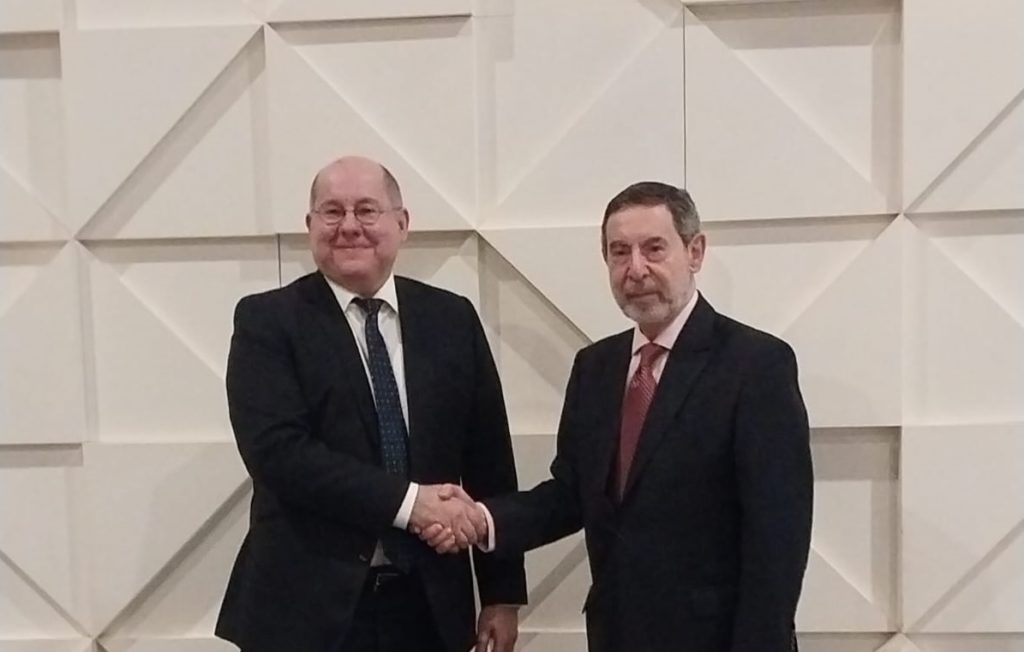São Paulo – Increasing the presence of higher value-added food and beverage products from Brazil in the Muslim market. That is the purpose of the agreement launched Monday (5) between the Brazilian Trade and Investment Promotion Agency (ApexBrasil) and the Arab Brazilian Chamber of Commerce (ABCC), called Halal do Brazil, in the headquarters of ApexBrazil in Brasília.
The project will initially run for three years and receive an investment of over BRL 15 million (USD 3 million) and aims to internationalize 500 small- and medium-sized enterprises.
The president of ApexBrasil, ambassador Augusto Pestana, and ambassador Osmar Chohfi, president of the ABCC, signed the agreement on the occasion. Pictured above, Pestana (L) and Chohfi (R).

Pestana said that the great success of ApexBrasil are the partnerships, mentioning that there are now approximately 55 sectoral projects in industry, agribusiness and services. He added that the agency has a special focus on micro and small businesses.
“This partnership will help diversify business partners and destinations of exports, being one more tool for breaking into markets and contributing to add value to our products. It’s one of those projects that make us proud,” Pestana said.
For the ABCC, this is a strategic partnership and part of the entity’s five-year plan to establish a fruitful, mutually beneficial relationship between the public and private sector, ambassador Chohfi said.
According to him, the Halal do Brasil project aims to strengthen the Brazilian product in the Islamic market, which comprises 57 Muslim-majority countries as well as the Muslim communities across the world. It also intends to boost and diversify exports from Brazil to these markets, as the Islamic bloc consumes USD 1.3 billion in food and beverage every year.
“Our purpose is to enhance and further empower the Brazilian production sector so that it has access to this growing market. We know that the Brazilian product has a positive image of high quality in the Arab market. We have the potential to go even further,” Chohfi said.
ABCC Marketing & Content director Silvana Gomes said that the project’s areas of operation are training and trade promotion, including the participation in food and beverage missions and trade shows in both Arab and non-Arab Islamic markets such as Malaysia, Saudi Arabia, France, South Africa, United Arab Emirates, and Egypt, to promote the Brazilian image as a halal supplier.
Gomes said Brazil already has the expertise in halal protein, and the challenge is now taking other products like açaí and rice to these markets.
ABCC secretary-general Tamer Mansour said he first visited Malaysia in 2001 to get to know the halal market in the country. He said that Brazil’s halal entities will participate in the project and teach its companies. “The project aims at engaging Brazil, increasing the value added, and boosting the share of products from Brazil on the shelves of Islamic markets,” Mansour said.
The Halal do Brasil project has been discussed for a year between the parties, Paula Soares, Agribusiness manager of ApexBrasil, said. She added that the idea arose in February 2020, during Dubai’s Gulfood trade show. “The Brazilian business community were interested in halal certification, but it was still a bottleneck, a mystery for many firms,” Soares said.
“The project will not only train but also support the company in getting halal certification with the support of Apex and the ABCC,” the manager said.
The signature of the agreement was followed by the fist meeting of the steering committee, featuring representatives of industry associations.
Translated by Guilherme Miranda




